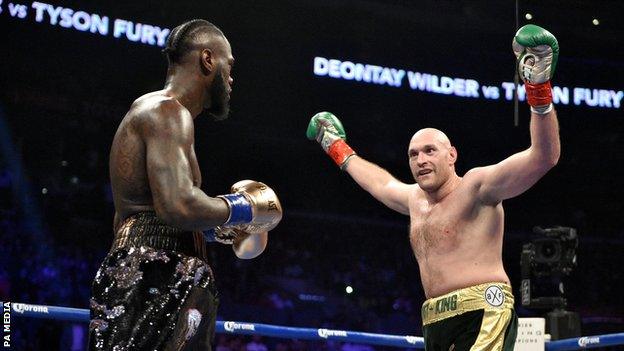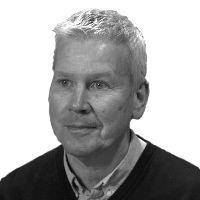'Wilder & Fury cap my 25 years in Vegas' - Mike Costello on highlights including Mayweather-Hatton
- Published
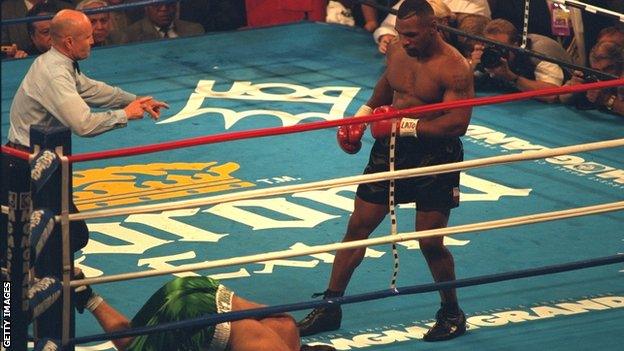
In 1992 Tyson was sentenced to six years in prison. He was released after three years on parole and fought Peter McNeeley in August 1995.
The Vegas experience is an assault on the senses and mine first came under attack in August 1995.
Down the years here, I've seen Mayweather, Pacquiao, De la Hoya, Lewis, Holyfield, Hatton, Calzaghe, Canelo and Golovkin bring different levels of entertainment to the ring, encompassing one of the great eras in the sport and embellishing the city's reputation as the fight capital of the world.
It all began with a circus billed as 'He's Back'.
Mike Tyson had been released from prison five months earlier and was making his return to the ring after serving a three-year sentence for rape. He needed all of 89 seconds to dismiss the Bostonian Peter McNeeley, and promoter Don King succeeded in dressing up the event as more than a legalised mugging, so much so that 1.5 million homes bought the pay-per-view broadcast in the US.
The promoters and TV partners involved in this week's rematch between Deontay Wilder and Tyson Fury would happily settle for such returns.
Within 15 months, Tyson would win and lose the world heavyweight title in the same MGM Grand Garden Arena - against Frank Bruno and Evander Holyfield respectively - and Iron Mike's presence was significant in the shifting of big Vegas fights from outdoors (in car parks of hotels such as Caesars Palace) to arenas under the casino roofs.
Tyson was a magnet for more than fight fans.
In an interview with an officer from the Las Vegas Police Department on one of my earliest visits, I was told how pick-pockets and hustlers from across the US would converge on Vegas for a Tyson fight with the mindset of a tennis player arriving for a Grand Slam or a golfer in town for a major - it was where the biggest prizes were to be won.
In more recent times, Floyd Mayweather has been the biggest draw.
"We have a lot of great events, and I mean great events, but a Mayweather fight here is one of a kind," said Richard Sturm, then the president of sports and events at the MGM, speaking in 2014.
Mayweather's showdown against Ricky Hatton in December 2007 created many stand-out memories.
Thousands followed Hatton across eight time zones, and by the middle of fight week strains of "There's only one Ricky Hatton" were driving Americans to distraction. The British fans changed the flavour in the fight hotel like never before, or since.
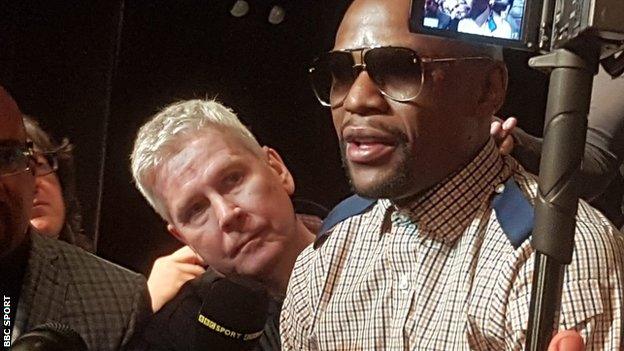
Floyd Mayweather has been the biggest Vegas draw, post-Tyson
As the ring announcer Jimmy Lennon Jr once said to me, when Frank Bruno was the subject of the Brits' warbling: "You never hear Americans singing Mike Tyson songs."
Weigh-in ceremonies staged in the main arena, with fans allowed in free on a first-come, first-served basis, are now a staple of Vegas fight week.
The night before the Mayweather-Hatton weigh-in, I was heading through the casino towards the media centre at just after midnight, ready to appear on the BBC 5 Radio Live Breakfast Show (shortly after 8am UK time) when I found myself in the slipstream of a Hatton fan holding a bottle of beer, and singing about his idol while bouncing off each of the perimeter walls 15 metres apart. And he didn't spill a drop.
When I left half an hour or so later, the same fan was slumped on the floor but had made his way into the queue for the weigh-in, which was already forming even though the boxers were not due to tip the scales until 2pm.
The fight competed for news coverage with the Rodeo National Finals and I remember reading in the Las Vegas Review Journal about a saying in the rodeo world: "Ain't never been a cowboy, ain't never been thrown."
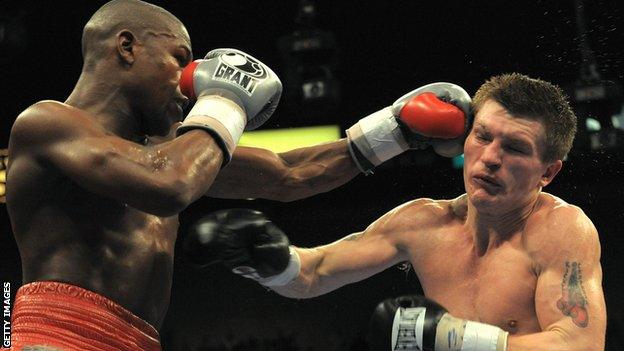
Mayweather beat Hatton in the 10th round in 2007 to retain his WBC welterweight crown
The tag-line on the posters for Mayweather-Hatton was 'Undefeated' - and it was Hatton who would come to be "thrown", stopped in the 10th round soon after shipping a majestic left hook.
The following morning, we returned to the MGM Grand Garden Arena for a special segment of Sports Personality of the Year 2007. Hatton and Joe Calzaghe were among the nominees and a makeshift studio was assembled at one end of the Arena floor. The programme went on air at 11am Vegas time, with a replica trophy on hand - and it went to Joe Calzaghe, presented to him by Lennox Lewis, with Hatton taking third place.
After the transmission, and the shower of plaudits, Calzaghe was running late for his return flight to the UK so we arranged transport to the airport. The Today programme on BBC Radio 4 wanted to record an interview with him for their show the following morning so I passed him my phone, joined him in the car and listened en route to McCarran International, wondering whether the listeners could hear in his voice the pride I could see in his face.
Calzaghe had been in Vegas to rustle up interest in a fight against Bernard Hopkins, whose promise that "I'll never lose to a white man" was brushed off by Joe as if it were dust on his lapel.
Tyson Fury on Deontay Wilder fight: 'All bullies fold when you stand up to them'
At a special media day in Mayweather's gym in April 2015, a fortnight before his showdown against Manny Pacquiao, Floyd Sr explained to me how he once used his son, who was then a young child, as a human shield when threatened at gunpoint during an argument over a drug deal. "If I hadn't used him, I wouldn't be here today. What would you do with a gun on you?"
Later the same day, I watched Mayweather corral the watching reporters into a semi-circle around a punchbag in one far corner of the gym. Such cameos are usually for show but he delivered his punches with a degree of care and precision that served as a reminder as to why and how the best become the best.
But the most compelling interview I've recorded here was in 2002, when Gene Kilroy - great friend and business adviser to Muhammad Ali - marked the great man's 60th birthday by wandering back in time to tell tales of Foreman, Frazier, Norton and the rest.
Kilroy was well connected, with what seemed like the freedom of the hotel, and insisted we chat somewhere quiet. So I conducted that interview in a wedding chapel.
Only in Vegas, you might say. And only in boxing.
- Published29 November 2021
